|
|
|
Sort Order |
|
|
|
Items / Page
|
|
|
|
|
|
|
| Srl | Item |
| 1 |
ID:
131613
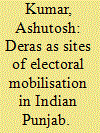

|
|
|
|
|
| Publication |
2014.
|
| Summary/Abstract |
Mushrooming of the deras in Indian Punjab, and the role of some of these deras in influencing the political choices of their followers, most of whom belong to the socially and economically marginal groups, is being recognised and apparently encouraged by the political parties. This is evident in the fact that political leaders/candidates cutting across party divides flocked to various deras in the run-up to the recent elections. This phenomenon can be attributed primarily to the fact that the social basis of political power of state has remained unaltered in favour of the upper castes/communities. Unwilling to share power, yet compelled to seek the crucial support of numerically strong and economically mobile dalit and other backward castes voters in a closely contested bi-polar polity, the upper-caste political leadership takes recourse to the 'softer' option of cultivating the deras to 'deliver' en bloc the marginal-castes votes. With one form of the identity politics based on ethno-regional communal divide having receded to background, it is the turn of the caste-based identity politics through the 'dera route' that is prevailing in post-militancy Punjab.
|
|
|
|
|
|
|
|
|
|
|
|
|
|
|
|
| 2 |
ID:
120213
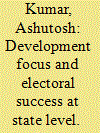

|
|
|
|
|
| Publication |
2013.
|
| Summary/Abstract |
Emergence of regional states in contemporary India as an effective arena for political and economic development has given state-level leaders a growing power. In the present coalition era, which reflects such regionalisation, this brings increasing prominence to effective state-based parties and their leaders. Focusing on recent politics of Bihar, this article shows in what ways Nitish Kumar, Chief Minister of Bihar, since 2005, unlike his predecessor Lalu Yadav, comes across as 'unusual'. Setting aside neo-patrimonial political tendencies, much in vogue among the new crop of state leaders, Nitish Kumar has instead focused on channelling both private and public resources to provide quality governance in an erstwhile 'failed state'. This, more than rootedness in a traditional community or vote bank, may largely explain continued electoral success, though a leader also depends on those around him, with all the risks for effective implementation that this entails.
|
|
|
|
|
|
|
|
|
|
|
|
|
|
|
|
| 3 |
ID:
093698
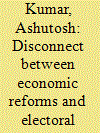

|
|
|
|
|
| Publication |
2009.
|
| Summary/Abstract |
Indian democracy is being globally acclaimed for its 'twin successes', namely achieving an impressive market reforms-driven economic growth in recent years notwithstanding ongoing global recession, accompanied with a consistent practice of democracy. Against the grain of such celebration of the 'widening' and 'deepening' of democracy in India under the shadow of globalization, the article argues that even though competitive politics is being understood as an essential 'democratic minimum' that cannot be dispensed with at the same time the concurrent depoliticization of policy process also ensures that it need not intervene in the substantive issue of economic policy. The article makes this point by visiting India's electoral politics since the initiation of neo-liberal economic reforms and taking note of the marked disconnect between the two.
|
|
|
|
|
|
|
|
|
|
|
|
|
|
|
|
| 4 |
ID:
151139
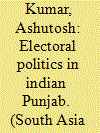

|
|
|
|
|
| Summary/Abstract |
The forthcoming Assembly elections in Punjab in early
2017 indicate signs of a new phase in the electoral history of this
state, largely dominated earlier by various political alliances headed
by the Shiromani Akali Dal (SAD) under Jat Sikh leadership.
Presented within the wider Indian electoral landscape, this article
offers an analytical overview of Punjab’s electoral politics as it has
evolved since partition from the vantage point of SAD. It is argued
that there are several good reasons why traditional SAD domination
and style of leadership are presently being challenged through a
combination of new political actors and, significantly, changing
awareness among a very diverse electorate about what to expect
from any government one elects.
|
|
|
|
|
|
|
|
|
|
|
|
|
|
|
|
| 5 |
ID:
083449


|
|
|
|
|
| Publication |
New Delhi, Pearson Longman, 2008.
|
| Description |
viii, 312p.
|
| Standard Number |
9788131707876
|
|
|
|
|
|
|
|
|
|
|
|
Copies: C:1/I:0,R:0,Q:0
Circulation
| Accession# | Call# | Current Location | Status | Policy | Location |
| 053874 | 338.954/BRA 053874 | Main | On Shelf | General | |
|
|
|
|
| 6 |
ID:
155043
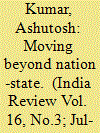

|
|
|
|
|
| Summary/Abstract |
The article refers to the processes that have been critical to the emergence of states as significant categories for the analysis of politics in India after a considerable period of academic neglect. It is in this context that the article considers the following research questions for discussion while referring to the state politics literature: what has been the contribution of the “first generation” of state-specific studies and to what extent has the “second generation” of inter-state comparative studies been able to take this forward? What could be the specific advantages of inter-state studies over single case studies? Finally, the article argues in favour of a need to develop further what may be considered the “third generation” of studies in the discipline, that remain comparative in nature but are in search of a much-nuanced grounded analysis; this would move beyond state-specific or inter-state studies and start taking up intra-state comparative studies, focusing on historical-cultural substate regions that have emerged as political (and economic) units within and across the constituent states of the Indian Union.
|
|
|
|
|
|
|
|
|
|
|
|
|
|
|
|
| 7 |
ID:
167567
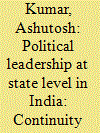

|
|
|
|
|
| Summary/Abstract |
Possible explanations are discussed in this article for the paucity of studies regarding political leadership, especially at the state level, in a well-functioning electoral democracy such as India with many parties and leaders. The article argues that such studies can be useful in making sense of the political and economic changes/shifts and developments of a particular state over a period that may have national impact. The article further argues that there has been a perceptible shift not only in terms of social composition but also in the “language” of politics used by the emergent generation of political leaders cutting across the party lines. The change has coincided with the rise of state-level parties and leaders in the post-Congress era followed by the ascendance of the Bharatiya Janata Party (BJP).
|
|
|
|
|
|
|
|
|
|
|
|
|
|
|
|
| 8 |
ID:
180899
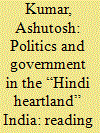

|
|
|
|
|
| Summary/Abstract |
The paper reflects on how feudal, caste-ridden and corruption-infested rural India had its first brush with the newly introduced democratic and governmental administrative institutions, culture and practices, much of the latter inherited from the late colonial times. It does it by visiting Shivpalganj, a fictious village in the “Hindi heartland” region, as depicted in the celebrated novel Raag Darbari, published more than five decades ago. Reading the satirical text shows vividly how the institutions were subverted by the local politics that was infested by factionalism, corruption and patronage. It also exposes the misconception that the bureaucratic “system” inherited from the British raj could be “adapted” for very different purpose of facilitating development and welfare than for what it was set up originally. The essay argues that despite significant social, political and economic transitions that have taken place over the last five decades, one finds a great degree of similarity in the way the “system” continues to work in the region which still in many ways represents “most of India.” It looks into the possible explanations for the continuity and change, if any.
|
|
|
|
|
|
|
|
|
|
|
|
|
|
|
|
| 9 |
ID:
060736
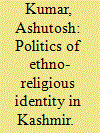

|
|
|
|
|
| Publication |
Apr-Jun 2004.
|
|
|
|
|
|
|
|
|
|
|
|
|
|
|
|
| 10 |
ID:
066643
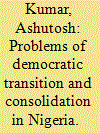

|
|
|
|
|
|
|
|